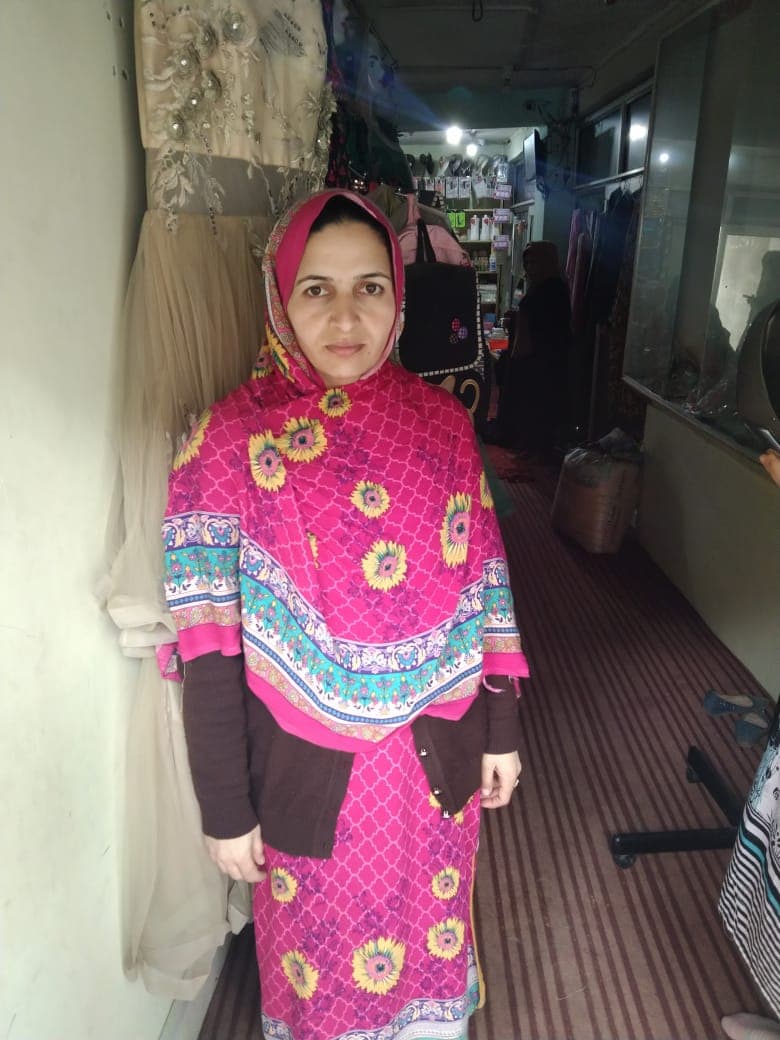[ad_1]
Zareena Begum, 33, came to north Kashmir’s frontier Kupwara district over a decade ago. In late-2000, she married a resident of Kachidhama-Meliyal village who had crossed over to the other side of the Line of Control (LoC). About nine years after the wedding, Zareena, originally Muzaffarabad (a town in Pakistan-occupied Kashmir, or PoK), accompanied her husband on his journey back home. They first went to Nepal and then entered India.
Zareena nurtured the dreams of a new life and a happy family. Now, those have shattered. Divorced by her husband, she is mentally ill and wanders the streets of Kachidhama-Meliyal. Villagers provide her with food. Her two children have been adopted by her husband’s relatives.
Zareena and others like her are known as the “brides from Pakistan”. They do not have citizenship rights and allege that they are living their lives “in a cage” owing to different reasons.
There are those who are finding it tough to make ends meet after being divorced by their husbands. Most of them want to return to their families across LoC, but cannot due to red tape and geo-political intricacies. And then there are those who are concerned about the citizenship status of their children and are tired of living every second with uncertainties.
With India and Pakistan declaring a ceasefire, some of them are cautiously optimistic.
“This ceasefire has happened for good. Human lives were in danger. People living in border areas, armymen were getting killed…This ceasefire has also raised our expectations, though we don’t know if our issues will be resolved at all…, says Saira Javaid, 43, who is originally from Karachi.
Saira is married to Javaid Ahmad Dar, 45, a resident of Khumriyal village in Kupwara. The couple and their four children — Laiba, 17, Bakhtawar, 15, Shahroaz, 11, and Shahriyar, 10 —live on rent in Kupwara town. Saira is at the forefront of a campaign demanding citizenship rights for “the brides of Pakistan” and their children.
“If they don’t want to give us citizenship rights and passport, they should simply deport us back to Pakistan along with our families,” she says.
Saira says women like her have Indian voter identity cards and Aadhaar cards, and that they even vote in elections. But the denial of citizenship status means that they are not eligible to apply for passports, which are necessary for visiting their families across LoC.
Saira puts the figure of such Pakistan-origin women and their families between 375 and 400 across Kashmir.
In the 1990s, when militancy peaked in Kashmir, several young men crossed over to PoK. Some of them enrolled in training camps for militants aided by Pakistan’s deep state, while others sought to escape the turmoil back home.
In 2010, the J&K government announced an amnesty policy for “ex-militants who…had crossed over” but “have given up insurgent activities due to a change of heart and are willing to return to the state”.
The policy promised rehabilitation for those who had gone to PoK between 1989 and 2009, and their family members. It said those returning to India would be permitted entry through the Wagah-Attari border, or Salamabad or Chakan-da-Bagh points along LoC, or the Delhi airport.
An official from J&K’s home department says the announcement led to the return of scores of Kashmiri men, but many of them took the Nepal route. “This meant they could not be covered under the official surrender policy,” says the official, requesting anonymity.
Nusrat Bibi at her shop in Kupwara’s main market. (Ubeer Naqushbandi)
There are others who arrived before the amnesty was announced. Like Saira, her husband and their two children (two of their four children were born on the Indian side) arrived on Pakistani passport via the Wagah border in 2007. The couple say their visa was valid for a month and that they were arrested for overstaying. They were later released, but a court case dragged on for nine years. In 2017-18, Dar managed to prove that he was a citizen of Jammu and Kashmir and had gone across LoC during the 1990s.
“Our documents, including passports, were torn into pieces by my husband’s family (to make sure that the couple could not return to the Pakistani side). They didn’t want to part ways with their son again. It was after that the authorities detained us and termed us foreigners living here illegally,” Saira says.
Saira runs a boutique at Hamdaniya market in Kupwara town, where she has employed Pakistani-origin women. Her husband drives his own bus. Saira says the fact that she and the others are not able to visit families in Pakistan is also taking a mental toll.
“Many of us have lost our parents. Someone’s brother or sister has died. But we got news on the social media,” she says. “What do they expect us to do? If they cannot give us Indian nationality, then they should give us NORI visa.”
A NORI visa is issued to refugees who don’t have Indian citizenship, but are permitted to stay here on the basis of a Long Term Visa (LTV). NORI visa allows LTV holders with no Indian citizenship to travel to Pakistan and return within 60 days.
Saira’s husband says earning a livelihood is not a problem for his family. “I have managed everything with Allah’s grace.” He is worried about the future of his children. “With no citizenship, they cannot have passport and cannot study abroad. What if they want to study in a foreign university tomorrow?”
The story of Nusrat Bibi, mother of two daughters, is one of hardship and struggles. She lives in Kupwara town and runs a tailor shop to raise her daughters, Muskaan, 11, and Saniya, 10.
Nusrat, originally from Ashkote village in Muzaffarabad, is among those abandoned by their husbands. “I had to live in a shanty for eight years. I did menial jobs and villagers used to help me. He didn’t even divorce me initially. It was after a lot of hectic efforts that he finally gave me a divorce,” she says.
Nusrat says she and her children should be deported back to Pakistan. She says she didn’t inform her family about her situation, but her father learnt about her plight from a mutual acquaintance who went across LoC on a cross-border bus. “He couldn’t bear it and died of shock. He kept it to himself. I only know why he died. It was due to me,” says Nusrat.
Even as a cross-border bus service was operational between 2005 and 2019, these Pakistani-origin women were not allowed travel as they did not have citizenship papers.
In the district development council elections held late last year, two such women — Somiya Sadaf from Drugmulla (Kupwara) and Shazia Aslam from Sonawari (Bandipora) — were in the fray. They completed formalities related to nomination papers, but on the counting day a controversy erupted over their citizenship issue and results of the seats were withheld. Eventually, fresh elections were announced for these two seats.
In the 2018 panchayat elections, Arifa Begum won Khumriyal uncontested. Originally from Muzaffarabad, she crossed over to the Indian side via Nepal in 2010. Similarly, Dilshada, from Karachi, won Prangoo uncontested. The government didn’t raise objections against their citizenship. They continue to hold positions of the panch.
A local administration official, requesting anonymity, admits that “nothing has materialised” in terms of a rehabilitation policy for these women. “There is no sort of relief or concessions provided to these families of Pakistani-origin women,” he says.
Click here to read Part 1 and Part 2 of this series.
Disclaimer:Ubeer Naqushbandi is a freelance journalist based in Srinagar
[ad_2]
Source link

